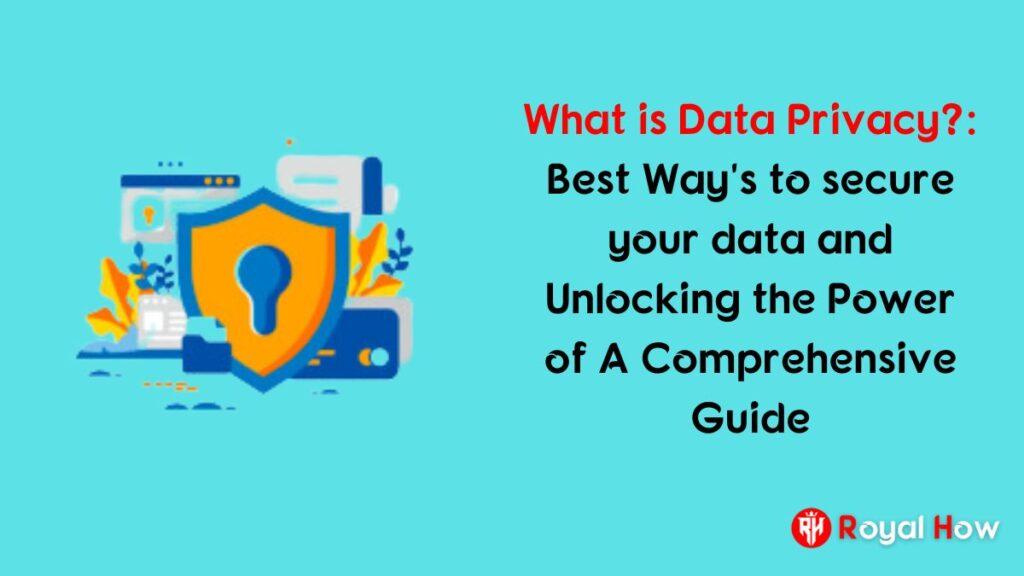In today’s interconnected world, data privacy has become a paramount concern. From personal photos to financial information, our digital footprint is vast and vulnerable. Understanding and safeguarding your data privacy is essential. In this comprehensive guide, we’ll delve deep into the intricacies of data privacy, providing you with expert insights and answers to frequently asked questions.

Data Privacy: The Foundation
Internet Privacy, often referred to as information privacy, is the practice of safeguarding personal data from unauthorized access, use, or disclosure. It encompasses a wide range of information, including your name, address, financial records, medical history, and even your online activities.
The Significance of Data Privacy
In an era where data breaches and identity theft are all too common, internet privacy plays a pivotal role in our lives. Here’s why it matters:
Protecting Personal Information
Your personal data is valuable, and it should remain yours alone. Internet privacy ensures that your sensitive information is shielded from prying eyes.
Preserving Online Reputation
In the digital age, your online presence can impact your personal and professional life. Data privacy safeguards your online reputation by preventing the misuse of your information.
Preventing Identity Theft
Identity theft is a grave concern. Data privacy measures can significantly reduce the risk of your identity being stolen and misused.
Ensuring Legal Compliance
Many countries have stringent data protection laws. Understanding and adhering to these laws is crucial to avoid legal troubles.
How to Safeguard Your Data Privacy
Now that we’ve established the importance of data privacy, let’s explore practical steps to protect your information:
Strong Passwords
Create unique, complex passwords for your online accounts. Use a combination of letters, numbers, and symbols, and avoid easily guessable information like birthdays.
Two-Factor Authentication (2FA)
Enable 2FA wherever possible. This adds an extra layer of security by requiring a second verification step, such as a code sent to your mobile device.
Regular Software Updates
Keep your operating systems and software up to date. Updates often include security patches to protect against vulnerabilities.
Be Wary of Phishing
Beware of suspicious emails or messages. Cybercriminals often use phishing tactics to trick individuals into revealing sensitive information.
Use Virtual Private Networks (VPNs)
VPNs encrypt your internet connection, making it harder for anyone to intercept your online activities.
Review Privacy Settings
Regularly review and adjust privacy settings on social media platforms and apps to control what information is shared.
Must Read:-
- Who is Data Analytics? How to find best Data Analytics in 2023
- Internet Security Firewall: Best Way’s Safeguarding Your Online Present in 2023
- What is Data Visualization? : Best Way’s to Unlocking the Power of Visual Data Representation in 2023
What is Data Privacy related [FAQs]
Q1: What is the most common mistake people make regarding data privacy?
A: One common mistake is using the same password for multiple accounts. This practice makes it easier for hackers to gain access to various aspects of your digital life.
Q2: Are free VPNs reliable for data privacy?
A: Free VPNs can be less reliable than paid ones. They may log your data or have slower speeds. It’s often worth investing in a reputable VPN service.
Q3: How can I protect my children’s data privacy online?
A: Educate your children about the importance of not sharing personal information online. Use parental control software and supervise their online activities.
Q4: What should I do if I suspect my data has been breached?
A: If you suspect a data breach, change your passwords immediately, monitor your accounts for unusual activity, and report the breach to the relevant authorities or organizations.
Q5: Can data privacy affect my credit score?
A: Yes, data privacy is connected to your financial well-being. Protecting your financial information can prevent identity theft and fraudulent activity that could impact your credit score.
Conclusion
In a world where data is more valuable than ever, understanding and implementing data privacy measures is paramount. By following the guidelines mentioned in this comprehensive guide, you can take control of your data and protect your privacy in an increasingly interconnected digital landscape.
